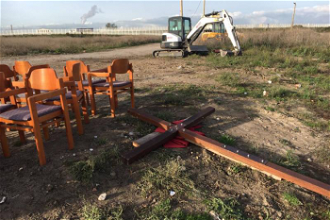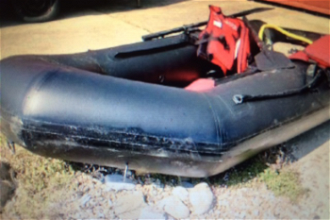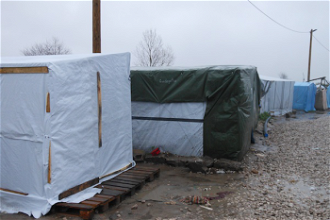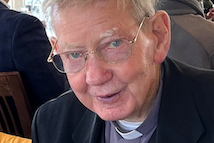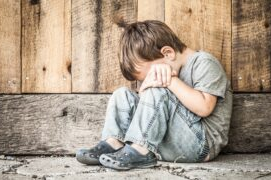Eyewitness: 'Eight miles: the distance between abject squalor and fresh dignity' - Calais/Dunkirk
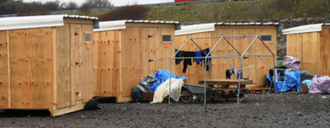
New MSF cabins shelter 6-8 people each
Fr Dominic Howarth and parishioners from Our Lady and All Saints in Basildon visited refugees in Calais and Dunkirk last week. He writes:
On Wednesday at 5.45am the minibus was as full as it could possibly be - crammed into every space, and stacked to the ceiling, were about 250 blankets and 120 sleeping bags.
It is very heartening to be able to say that by 7pm on Wednesday evening, as we were leaving the new Médecins Sans Frontières (MSF) camp at Dunkirk, 370 people were being kept warm overnight - and no doubt for many weeks to come - by those same sleeping bags and blankets.
They have been paid for by donations from parishioners, churches across Basildon, and parishes and individuals across the Diocese of Brentwood and beyond. Additionally many sleeping bags and blankets had been donated; some parishioners had even purchased brand new ones, still in their packaging. To you all, thank you.
Every visit to France has been different, and this one was no exception. Within twelve hours we saw the best signs of hope that we have seen in the last six months - as well as some of the most shocking and vile conditions that we have experienced.
After a choppy ride on ferocious seas, we landed at Calais a little washed out, and made our way to the Care4Calais warehouse. We had twelve boxes of Italian army socks, donated by East-West trading, the army surplus store in Laindon that had given us the very thick and comfy army officers blankets for a fraction of their true price, putting our donated money to the best possible use. We dropped off the socks, and loaded in tarpaulins and flashlights, and then we were immediately directed up to Dunkirk.
After seven months where we have seen mud, bits of tarpaulin and bin bags, limited sanitation, and heroic volunteers trying to hold things together in often grim conditions in Calais, driving into the new MSF camp at Grande-Synthe, Dunkirk was - quite literally - almost unbelievable. This camp has been open for just three days. It is the first refugee camp in France to be built to international standards, and it really shows. There is dignity here, space, proper sanitation, decent kitchens. There is a sensible range of distribution points, to avoid random distributions out of the backs of trucks. It is on private property, so the police are at the entrance but not inside, and instead a well briefed range of volunteers ensure welcome, kindness and peace. There are even children riding bikes, and one boy on roller skates - children and adults actually smiling. There are sockets to charge mobile phones, to keep vital connection to families at home.
All of that said, is it still basic? Yes - the accommodation is wooden shelters, built to house 6-8 people. There is no electricity to the shelters - yet. There are 1200 people here, and although there are decent numbers of toilets and showers, they will undoubtedly be heavily used. This is not five star living. But it is dignified. For the first time in these long months people can sleep somewhere dry, and can be secure. There is medical help being run from a permanent building, not a tent or tiny caravan. And all of this offers hope, at least for the short term. It is an amazing achievement, and MSF and all who have got this together deserve recognition and praise. The psychology of being welcomed into such a place will, I hope, offer a restored sense of peace and dignity for all who are housed here.
Who are the 1200 living here? Kurds, from Iraq and Iran. Some of the most persecuted people in the world, who have fled from one of the most violent places in the world.
We put the blankets into a container, and began to help distribute them, to new arrivals. We watched as people carried the blankets we had brought to the little wooden shelters, and it was direct aid in action, faith in action. Tim Blake, from Living Word Community Church, spoke about how an older member of his congregation had phoned and offered two blankets. He had been round to pick them up in Basildon last night - and now put them into the arms of someone very evidently in need of them. Compassion from Basildon, linked to Iran and Iraq, via Dunkirk. This is what it means to be brothers and sisters.
And then, abruptly, the experience of our day was very sharply refocused. The minibus, empty now, could be used to move people from the old camp, where about fifty still remained. So we drove over - and the contrast of what we had come from and what we arrived into will stay with me for a very long time. Even Calais at its worst was not as bad as this. In a relatively small area, hundreds of the most basic shelters were jammed together. Literally made from what people could scavenge - bin bags, carrier bags, some bit of tarpaulin, sticks of wood taken from trees. And all of it in a sea of mud - deep, boot-soaking, thick and relentless mud. I cannot imagine living in such a place for more than ten minutes. Some had lived there for seven months.
The desperate need for our blankets at the MSF camp became clear as volunteers explained to us that people had had to leave a lot of things behind - bedding, especially, and clothing. Why? Because this camp - the 'Dunkirk jungle' - was riddled with rats and scabies.
We made several journeys during the afternoon, on one occasion driving through thick smoke as a tent had been set on fire - it was unclear why, or by whom, and we were warned that gas canisters could have been put into the flames, so they would randomly explode (which they did!). It was crazy behaviour, in the febrile situation of near disbelief that this hideous place was finally no longer going to be "home" to 1200 people.
If our insurers are reading this, look away now. Because if driving the minibus through the billowing smoke might have invalidated the insurance, carrying refugees in the minibus was - apparently - a criminal offence. We were told that on Monday the Mayor of Grande-Synthe was briefly arrested for 'people trafficking' because he had laid on transport to move the migrants from the squalid and filthy mess of the 'Dunkirk Jungle' to the MSF camp, and driven one of the buses himself. I cannot verify that, but it does fit with the news reports that the MSF camp does not have the permission of the French Government and could be closed down. There are no words adequate for that - just look at the pictures of the two camps and try to comprehend such a decision. It is beyond me, and I pray it does not happen. The journey between the camps is about eight miles, which is not too far, but it is dangerous as much of it involves walking along roads comparable to the A13 and M25. Just picture that: walking eight miles along the hard shoulder of the M25, crossing at least one major junction, and making the walk in shoes and clothes full of mud, carrying what you could bring. Thank God for the humanity of a mayor who put on transport.
And for all that, the day ended well. A group of seven refugees could not bring themselves to leave the place that - notwithstanding rats, scabies, mud and rain - they had come to call "home." When you have faced one uncertainty after another, I suppose this is not a surprise. As the afternoon went on, we ferried people and supplies until just these seven remained. I am still not sure what finally convinced them - the fires that were burning, the fact everyone else had gone, the police at the gate, or the minibus offering them and their bits of kit a lift over to the new camp. But suddenly something changed, and they swiftly packed up and, smiling, climbed onto the minibus. It was clearly a very poignant moment for them and the volunteers, the end of something that they had not quite believed could ever end and, God willing, a new beginning.
What happens next? Clearly the MSF camp is a solution only for a few weeks or months. These are bright, articulate, skilled people - there was already a little solar panel on the side of one hut, rigged by an enterprising refugee, generating a bit of power inside. We will be in touch with MSF to see the needs - perhaps books, as a school might begin. Certainly medicines. Always blankets and food. We will see - and we will continue to use donations wisely.
And of course, there is Calais. We drove back along the motorway as darkness was beginning to fall; the great scar of earth where the bulldozers have done their work is evident. The roads to the camp were blocked. There were some fires burning.
The particular tragedy of what has been done to the camp at Calais is the near certainty that camps like the 'Dunkirk Jungle' - pitiful, inadequate, wretched makeshift camps - will burgeon because such a swathe of the Calais camp has been eliminated. Like the 'Dunkirk Jungle' these little camps will have almost no sanitation, and nothing but piecemeal support from heroic charities like Care4Calais. On each visit I notice how increasingly weary the volunteers are. They are keeping going by sheer willpower and determination that where Governments across Europe are failing so badly, decent hearted people will not give up on fellow human beings. We will do all we can to support them from Basildon - for us, as people of Christian faith, the refugees and the volunteers are our sisters and brothers, created in the image and likeness of God. We need no other motivation.
As we drove home, the extremes of the day had taken their toll on all of us. And yet the existence of the MSF camp, and the decency and dignity of the entire vision that had gone into it, gives such hope. Please pray for every volunteer and every refugee sleeping somewhere in Europe tonight.
Fr Dominic Howarth
Read more about Seeking Sanctuary here: http://seekingsanctuary.weebly.com/



